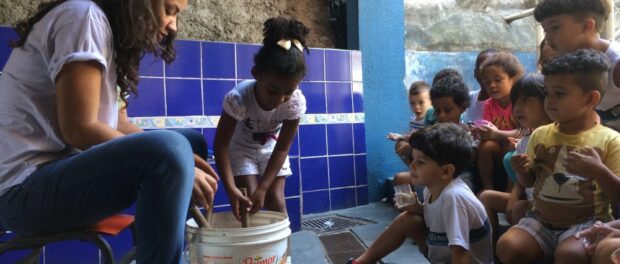
It is not a simple task to keep the attention of twenty children between two and three years old. But on a Monday afternoon, a young crowd sits straight in their little concrete backyard at the public daycare of Tia Dora in Providência. The attraction they are looking at is a bucket full of soil. It has been brought there by Elisângela Almeida Oliveira.
Elisângela is coordinator and founder of Horta Inteligente, or Intelligent Garden, a community-based NGO whose aim is environmental education for children. In addition to the bucket she has brought some painted pots made of former plastic bottles and white bean seeds. When called on, every child may grab a blade and put some soil and a bean in their vessel. With pride and pot they return to their seat and wait until it’s time to water their plants-to-be.
“Here in Providência children don’t have much contact with nature,” Elisângela explains. “There isn’t a lot of public green space. For some of them it’s the first time they put their hands in the soil and play with mud. They don’t know about what they eat, where their food comes from. And they don’t eat a lot of vegetables and fruits. For their parents it’s very expensive.”
Although being a resident of Providência herself, Elisângela’s childhood was different. Before she came to Rio with her mother and four siblings, Elisângela lived in Vitória da Conquista in the State of Bahia. The lack of infrastructure and perspective brought them to the city, but Elisângela still remembers how happy she was to see a watermelon growing in their garden when she was younger.
That said, Horta Inteligente is about more than growing fruits and vegetables. When Elisângela started the NGO two years ago, she actually had something different in mind. As a trainee of Agência Redes para Juventude, or Networks for Youth Agency, she planned to start a community recycling project. But then she realized how hard it is to change adults’ fixed habits. “It will take thirty years,” people told her. “So I came up with the idea to create a gardening project for kids and within the methodology teach them not to throw garbage on the street.”
Since then Elisângela has established the educational cycle of the project as up to two months. Within that period she combines lessons in painting pots, cooking vegetables, gardening and recycling. In the end both children and their parents are asked about how they liked the project and what the impact was.
“I really love children. They inspire me, how they absorb everything,” Elisângela explains. “When you tell them something like they shouldn’t throw trash on the street, they keep it in their heads. And when they see their relatives doing that, they tell them not to. They are very intelligent.”
More than 400 children have undergone the training in Horta Inteligente’s first two years. Some of them got their education within the daycare, others took part in workshops that Horta Inteligente offers during fairs or in their own small garden at the Centenary Methodist Church in nearby Gamboa. Before being turned into a community garden, the area was abandoned and full of trash. Through a mutirão collective action they cleaned up the space and opened it to the public.
All funding for Horta Inteligente currently comes from selling their educational programming to private schools and seedlings at fairs like Ekobé in the nearby Praça Mauá. They utilize the social network of Atados for connecting their NGO with outside volunteers.
The program is currently volunteer-run, Elisângela managing it together with her partner Lorena, an environmental engineer from Niterói. However, Elisângela does consider the possibility that Horta Inteligente will develop into a career. At only 20, and Lorena only 24, the two and their project are full of potential: “We are still young and a lot of people don’t believe in us,” they say. “‘How will you achieve that?’ they ask. But I say, ‘of course we will!'”



